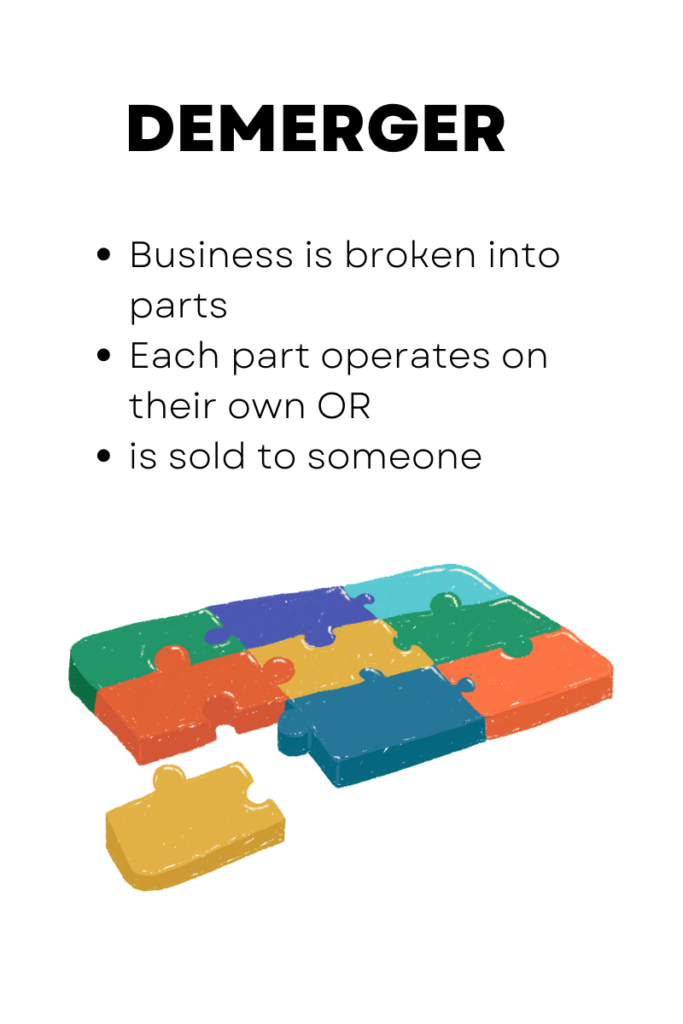A demerger is when a business is broken into parts and each part either operates on their own or is sold to someone. A demerger allows large companies to split their businesses.
Table of Contents
Understanding demerger
Let’s understand this concept with an illustration. Suppose there is a company called ‘John Black Ltd’. The company is engaged in manufacturing and providing cement, textile and garments, jewellery and information technology services. Now the company wants to separate its information technology business into a new entity. Here ‘John Black Ltd’ can announce a de-merger whereby the information technology business will be broken out and would function on its own (like an independent company). The rest of the business would remain as is.

Types of De-merger
There are different types of de-mergers of a company. Lets learn about them in detail.
Spin-off
A spin-off is one of the most common types of demerger. Here, a business of the company separates and forms a new legal entity. The parent company does not dissolve. The parent company normally gets equity shares in the new company.
Split-Up
A conglomerate company splits into two or more different companies where each company holds different lines of business.
Equity Carve-out
In an equity carve-out, the parent company sells some of its portion of equity to a third party or a strategic investor. A certain part of the business is sold to an external party. This is why such de-mergers are called equity carve-outs.
Split-off
In a split-off, a business vertical is first separated into a different company. Then this company is sold off to another company.
Divestment
This type of demerger is done in case of government companies in India. The Government reduces its holdings in Public Sector Undertakings (PSU’s) by selling its equity shareholding.
Advantages of a De-merger
- A de-merger is an excellent strategy for companies and conglomerates who want to focus on profitable businesses, reduce risk and create greater value for shareholders and investors.
- There is increased management accountability, as the demerged company functions as a separate company with their independent balance sheet. In a conglomerate, the demerged company cannot live off on the earnings of other profitable group companies.
- The new demerged entity may file for an IPO. This would increase the market capitalization of the conglomerate as a whole.
Disadvantages of a De-merger
- The company loses the benefits of economies of scale that it enjoyed prior to a de-merger.
- A de-merger is generally very expensive. These need to be structured carefully to avoid spiralling costs.
- After a de-merger the employees could find the new company not suitable to their aspirations and they may leave jobs. There can also be lay-offs after a de-merger.
- There is a possibility of clashes within top management as the de-merger would increase the number of top-level managers. This could be detrimental to the performance of the company.
How can shareholders/investors benefit in a demerger?
The demerged business may issue shares or may file for an IPO. Existing shareholders of the parent company may receive shares of the new demerged entity. Like in case of Jio Financial Services, the shareholders in the parent company, Reliance industries received Jio Financial Services shares in the ratio of 1:1. Meaning for every share held in Reliance industries, they received 1 share in Jio Financial Services for no extra cost to the shareholder.
De-merger Examples
- In October 2022, Reliance Industries announced the de-merger of its financial services arm. A new entity called ‘Jio Financial Services’ would be formed and would file for an IPO.
- In 2021, Piramal Enterprises conducted a demerger of its pharmaceuticals and financial services businesses. Two listed entities were formed one for the pharmaceutical business and one for financial services.
- In 2013, Wipro demerged its non-IT businesses namely Wipro Consumer Care & Lighting, Wipro Infrastructure Engineering and Medical Diagnostic Product & Services into a separate unlisted company called Wipro Enterprises.
Image credit: Image by rawpixel.com on Freepik



